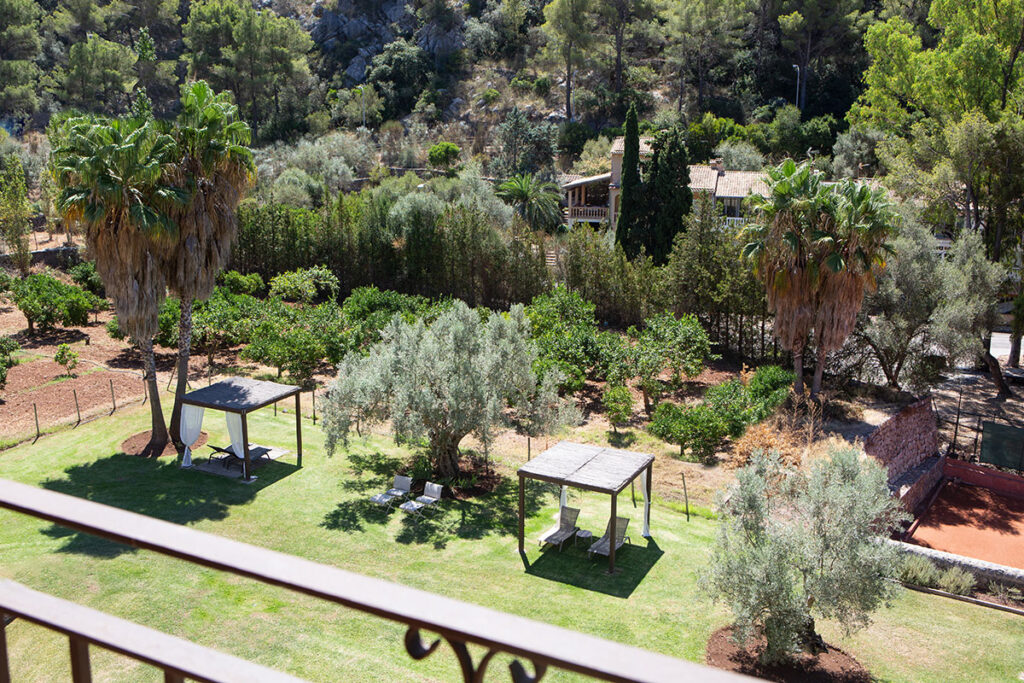Located in a privileged setting, in the Port of Sóller, Hotel Es Port represents an exemplary model of sustainable tourism. This family-run establishment, which combines history, nature and comfort, has demonstrated a strong environmental commitment by implementing good ecological practices and obtaining prestigious international certifications. This post explores in depth the concrete actions that have led the hotel to become a pioneer in Spain in hotel sustainability, including its active participation in the Balearic Government’s Circularity Plan and its impact on the guest experience.
Leadership in environmental certifications: Travelife and GSTC
Travelife certification: a solid foundation
For several years, Hotel Es Port has held the Travelife Gold certification, one of the most recognized in the tourism sector. Travelife evaluates more than 160 criteria related to environmental management, respect for human rights, labor conditions, and local socioeconomic impact. Obtaining this certification involves regular audits and continuous improvement, which guarantees the consistency and seriousness of the hotel’s commitment.
GSTC: First certified hotel in Spain
The big milestone came in 2024, when Hotel Es Port became the first hotel establishment in Spain to obtain certification from the Global Sustainable Tourism Council (GSTC). This international entity sets sustainability standards recognized by the UN. The audit was conducted by Vireo Srl, a GSTC accredited entity. This certification recognizes that the hotel meets rigorous criteria in terms of environmental management, support for the local community, respect for culture and heritage, and improvement of working conditions.
Circularity in action: an integral vision of tourism
The Government of the Balearic Islands’ Circularity Plan
Hotel Es Port has been one of the first to implement a Circularity Plan in accordance with the new Balearic regulations. This plan requires hotel establishments to adopt specific measures to close consumption cycles, promoting reuse, repair, recycling and efficient use of resources. The plan also obliges them to establish partnerships with local companies, reduce waste generation and promote the use of clean energy.
Examples of applied circularity
The hotel has adapted its daily management in line with these principles. For example, it has replaced single-use amenities with reusable dispensers, optimized the laundry system with low-consumption cycles, and adopted a gardening model that prioritizes drought-resistant native plants. In addition, it maintains collaboration agreements with small producers in Sóller and the surrounding area, promoting a sustainable local economic circuit.
Specific sustainable practices: How the commitment is translated into action
Water management
On an island with limited water resources, water management is a priority. Hotel Es Port has installed aerators and flow reducers in faucets and showers and uses programmed drip irrigation systems. Grey water from toilets and showers is channeled to tanks for purification and once treated, is reused for irrigation. It also has a system for capturing and reusing rainwater for garden irrigation. All this has led to a substantial reduction in water consumption per guest.
Energy efficiency
The hotel has replaced all lighting fixtures with LED technology and has installed presence sensors in common areas. The use of solar energy for domestic hot water heating is one of the keys to its energy model. Air conditioning systems with centralized control and timers have also been introduced to reduce energy waste. The use of an electric van for logistics services and the rental of electric bicycles to customers complete a clear commitment to sustainable mobility.
Waste reduction and management
The zero single-use plastics policy is complemented by a multi-separator recycling system available to both guests and staff. The hotel’s kitchen has adopted purchasing management based on actual demand to reduce food waste, and organic waste is composted or sent to local livestock organizations.
Biodiversity conservation
The hotel is located on a 40,000 m² estate that includes an organic orchard and centuries-old olive trees. These spaces not only partially supply the kitchen but also serve as a refuge for native fauna. Nest boxes, insect hotels and a naturalized pond that serves as a watering hole for birds have been installed.
Social and cultural sustainability
Hotel Es Port integrates social sustainability by hiring local staff, promoting the estate’s historical heritage (a 17th century defense tower), and organizing cultural activities, such as traditional cooking workshops and guided excursions through the Tramuntana Mountains.
A sustainable and authentic guest experience
Sustainability is not only perceived in the technical systems of the hotel, but also in the daily experience of the guest. From the possibility of tasting local products to participating in environmental awareness activities or relaxing in a natural environment without artifice, every element of Hotel Es Port is designed to offer a sustainable vacation in Mallorca.
Guests are also provided with information on how to reduce their footprint during their stay and are invited to join initiatives such as reusing towels or turning off unnecessary lights. This involvement contributes to creating a community of responsible travelers.
Positioning as a benchmark in eco-tourism
Thanks to all these actions, Hotel Es Port has established itself as a benchmark among sustainable hotels in Mallorca. It is a clear example of how it is possible to align profitability, customer experience and environmental respect. In the context of growing demand for responsible tourism in Mallorca, Hotel Es Port demonstrates that sustainability is not a fashion, but a necessity and a competitive advantage.
FAQ
What does the GSTC certification imply for a hotel?
GSTC certification guarantees that the hotel complies with global standards in environmental, social and cultural sustainability. It involves a rigorous external audit and continuous improvement of its practices.
What is the Circularity Plan of the Balearic Government?
It is a regulatory initiative that seeks to reduce the environmental impact of the tourism sector by reusing resources, reducing waste and promoting local suppliers.
How does hotel sustainability affect the guest experience?
It enhances the authenticity of the stay, allows more direct contact with nature and local culture, and offers the possibility to actively participate in the care of the environment while on vacation.
